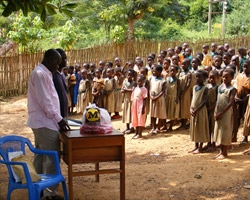|

|
| Helping this pupils is our major priority |
The Girl-Child Needs Adequate Formal Education
There is increasing concern now than ever for parents
and the nation at large to invest in the education of the girl-child. With technological advancements at global
levels, it has become obvious that the individuals as well as the nation have major roles to play in order to
improve upon the living conditions of the citizenry. The fact that good education will emancipate women and their children,
the vulnerable groups in society, and for that matter increase women’s participation in development issues, cannot be
over-emphasised.
Many girls enroll in school with their male counterparts but
most of the girls are unable to go further for various reasons. Some of them discontinue their education because of the lack
of parental care resulting from broken homes which sometimes lead to forced marriages and unwanted pregnancies, lack of motivation
or poor traditional perceptions about the girl-child being in school.
However, all these obstacles not withstanding, the girl-child
needs to be advised to enroll and stay in school as their counterpart boys do. The affirmative action implemented by some
tertiary institutions whereby entry grades are adjusted to make room for the intake of more girls is good but more needs to
be done at the basic level to retain girls in school. This is envisaged to help many of them get to the threshold of success.
According to statistics, females form the greater percentage
of the nation’s population; there is, therefore, the need to empower them to be elevated to certain levels so that the
inadequacies in their education will not affect the country’s development. The girl-child needs to be encouraged to
go further and acquire sufficient knowledge. This will expose females to employable skills and other viable avenues to open
them up to job opportunities which will enhance their status and bring them economic emancipation.
Well-educated girls who become mothers will be able to manage
their domestic affairs judiciously. They will insist on well- planned homes and invest in the education of their children
because of their economic empowerment. This can reduce the number of children we have on our streets, as well as the number
of women who contract HIV/AIDS, other sexually transmitted diseases (STDS) and it can also ease the financial burden on responsible
fathers thereby bringing peace and harmony to homes.
The girl-child who stays long enough in school would not need
any other person to read instructions on operating manuals to her before she installs or uses appliances wherever she may
be. She will also read and understand instructions on medications before administering them to herself or to her children.
In other words, adequate education will enlighten women to become less superstitious. All these will reflect in the upbringing
of their children. It will be a form of inspiration to those who come into contact with such women and their children.
It is gratifying to note that the few well-educated women
in the society play significant roles in nation building because they are mentally and emotionally exposed and emancipated.
Therefore, when more girls acquire higher academic laurels, this nation will be in a better position to develop faster than
what is going on now. Moreover, with adequate education, women become empowered, independent, more courageous, and vocal as
well as avoid indulgence in activities that inhibit their progress. For example, with adequate education and enlightenment,
mothers themselves will be in a unique position to deal with child trafficking which is becoming a canker, so many years
after the abolishing of slavery. They will no longer entertain people who come to deceive them about the up-keep of their
children.
The government has done well by passing the Domestic Violence
Act (Act 732). It is now left to the public in general and to women in particular to articulate and know what to do when problems
arise. As of now, most women are afraid or feel shy to talk to people about their problems. They keep quiet until situations
get out of control. So many acts of violence take place especially gender-based violence are settled at home without bringing
the perpetrators to book because in the first place, some of the victims and relatives do not know how to access legal aid
and secondly, they are afraid of stigmatisation. Adequate education will free girls and for that matter women from intimidation
and let them move forward. Education and determination are the only means by which the fair sex can get out of the doldrums.
With more girls staying in school to have the requisite knowledge,
the number of women in politics and other leadership positions will increase. There are fewer women in politics now because
most of them are not well resourced.
The educated ones can mentor, motivate and impart positive
attitudes and principles among the rest in the society. This can positively affect our cultural and traditional values concerning
women. The nation will be looking forward to having a female president when women are equipped with adequate education.
The need for adequate girl-child education has been of great
concern to many people over the years. The late Doctor Aggrey simply put it that “When you educate a woman, you educate
a nation but when you educate a man, you educate an individual” With this famous expression in mind, governments over
the years have put various structures in place to cater for girl-child education. We have had the Free Compulsory Universal
Basic Education (FCUBE) and now it is the New Education Reform. It is therefore left to all and sundry to contribute their
quota by making sure that the girl-child of school going age in every nook and cranny is sent to school and helped to stay
in school. In this way, as Doctor Aggrey envisaged so many years ago, the nation will be educated.
A leading Ghanaian educator says standards have fallen in
recent years…
TIP: GHANA / FIFTY YEARS – Since gaining independence
fifty years ago, Ghana has made significant strides in education. Many officials credit the improvements to past governments
as well as to the current administration, headed by President John Kufuor. Together, they say, the policy initiatives have
contributed to meeting the educational needs and aspirations of the Ghanaian people. But Professor Jophus Anamuah-Mensah,
the vice chancellor of the University of Education in Winneba, disagrees. In the final installment of our series on fiftieth
independence anniversary of Ghana, we focus on education.
At the dawn of independence, Ghana had only one university
and a few primary and secondary schools. Today, there are over 12 thousand primary schools, and over one thousand junior an
senior high (secondary) schools. In addition, there are over a dozen technical institutions and five universities.
Many say in comparison to other Africans, Ghanaians have ready
access to education.
Professor Anamuah-Mensah said although Ghanaian education
was once rated the best in Africa, in recent years it lost that status when many of the teachers left for better pay and opportunities
abroad.
“Since independence, education at that time was rated
as the best Africa country with the best education system because we were able to get almost everybody into the schools, and
the quality of education was high. But with time the quality of education deteriorated; economic conditions were not favorable;
a lot of teachers left for other Africa countries especially Nigeria,” he said.
Anamuah-Mensah said the quality of education was damaged by
the exodus of Ghanaian teachers abroad. “You couldn't find enough teachers in the schools and therefore education really
went down. Until 1987 we embarked upon the educational reform, which tried to address the issues, but could not because the
teachers were still not around,” he said.
Anamuah-Mensah said teachers play a significant role. “In
any educational system the teacher plays a critical role. If you don't have the right kind of qualified teachers and in the
right numbers, you would not be able to make it. Teachers that we have in the primary schools all went through the teacher
training colleges, they have certificates A. Certificate A, is not sufficient enough for these modern times,” he said.
Anamuah-Mensah said all the teachers need further education
themselves. “We need to re-train all the teachers that we have and prepare them well for the new age that we have entered
into. We had all those structures as we mentioned, but without the teachers to man and really help to nurture the young children
to acquire the right skills and so on, we would not be able to respond positive to this. We are still behind because the teachers
are not there,” Anamuah-Mensah noted.
He said the education system needs a major investment to enable
Ghana regain its past glory.
“I think a lot of money should be pumped in education, because education is the mainstay
of this country. We need to ensure that we provide the junior secondary and senior secondary schools with IT facilities so
everybody there would be computer literate.… We need to ensure that the laboratories are there, the research departments
of the universities need to be adequately funded…. I believe that if we keep on doing the right things, Ghana can regain
its past glory and rub shoulders with the international world,” he said.
Educational Needs.
Ages---------3years ------------------ 18years
1.Learning Books------------from Primary to Snr.High School
Science, Mathematics, English,Social Studies,Agriculture, Economics,Business, Accounting,and
other Books.
2.Writting Materials----------Pen,Pencils, Crayons, Chalk,Blackboard,mathematecal
set,drawing board,and others.
3.Building Infrastructure------ Helping Erect new blocks of classrooms,playground,entertainment
centres,recreational centres.school KVIP's --place of convenient, borehole water.
4.Electronics----Computers,laptops and other electronic equipments for early learning
and other.
5.Provide School sandals,shoes,school uniforms, school back pack's, bicycles ,and
other items that can help improve the learning capabilities of the children to improve themselves. School tables and chairs,
School desk,Teachers Desk and chair, Office equipments,and accessories are all welcome.
|

